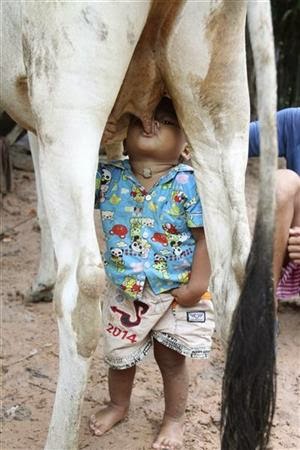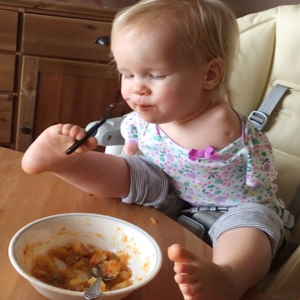In a world where baby bottles and formula reign supreme, a remarkable story has emerged, defying conventional norms of infant nourishment. Meet little Ethan, an 18-month-old toddler who has captured hearts and raised eyebrows by choosing a most unconventional source of sustenance—fresh milk directly from a mother cow.

For Ethan’s parents, the journey into this unconventional choice of nourishment began innocently enough during a family visit to a local farm. The toddler, known for his curious nature, developed an immediate fascination with the gentle-eyed creatures grazing in the pasture. However, what transpired next took everyone by surprise.
Ethan, with an instinct that seemed beyond his tender age, approached a mother cow and, much to the amazement of onlookers, latched onto her udder. The scene unfolded as Ethan contentedly sipped fresh milk, bypassing the traditional bottle that usually accompanies toddlers of his age.

This peculiar dietary preference has sparked a mix of reactions from the community and beyond. While some applaud the natural connection between humans and animals, viewing it as a harmonious blend with nature, others express concern about potential health risks and question the nutritional adequacy of cow’s milk as a primary source for an 18-month-old.
Pediatricians and nutrition experts weigh in on the matter, emphasizing the importance of a balanced and age-appropriate diet for toddlers. The consensus, however, remains elusive as the phenomenon challenges established norms and stirs debate about the adaptability of the human digestive system to unconventional dietary choices.

Ethan’s parents, initially taken aback by their son’s unorthodox preference, have sought guidance from healthcare professionals while defending their decision to let nature take its course. They highlight Ethan’s robust health and developmental milestones as a testament to the unexpected dietary choice’s apparent success.
As the story of Ethan and his unconventional nourishment choice spreads across social media and news outlets, it raises broader questions about the relationship between humans and the animal kingdom. Is Ethan a symbol of a primal connection lost in modern society, or is this a unique case that should be approached with caution?

One thing is certain: little Ethan has become a focal point in a broader conversation about parenting choices, dietary norms, and the evolving dynamics of the parent-child relationship. As the world watches this unusual journey unfold, one cannot help but wonder about the potential impact of Ethan’s story on the way society views the age-old relationship between humans and the animals we share our planet with.





